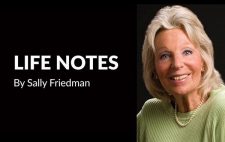My holiday is a minor one on the Jewish calendar called Hanukkah. It’s a blip on the Jewish holiday radar screen, a pleasant but second-string festival. It’s not the “Jewish Christmas.”
But here we are, a multicultural society, still struggling to understand one another’s ways. And sometimes, we need road maps to guide us. I’ll never forget the neighbor, back in the days when we were suburban pioneers, who was horrified that our children were deprived of Christmas. And “deprived” was her concept, not ours.
We could share so much as homesteaders fighting crabgrass and learning the ropes of our new community together. But this good-hearted woman simply could not comprehend why our three daughters were deprived of that childhood rite of passage, a visit to – and from – Santa Claus.
And yes, it all seemed so glorious to three little Jewish girls who had no such excursion. And what would be the harm of a little Christmas tree? Not one of those towering ones, just something small and simple for the kids.
Our neighbor always invited our little ones to see her family’s tree, and that was fine. The tough part was when they came home to our tree-less world.
I know our neighbor meant well. I understand that her heart went out to Jill, Amy and Nancy, who might as well have been Dickens urchins, so dreadful was their lot in life.
And you can bet those daughters of ours caught right on, and clamored for the best of both worlds: a little Hanukkah and a little Christmas would have delighted them back in those days.
There were years when I keenly felt our difference. After all, ours was the only house in the neighborhood without Christmas lights, and it always looked so forlorn in the wonderland of sparkle and glitter. Our kids had no post-Christmas tales of stockings filled with candy canes and gaily wrapped gifts. There was no caroling around the piano.
There was, in fact, no Christmas at all at our house, a quite conscious decision, especially as our daughters got older and began establishing stronger Jewish identities. We wanted them to know with certainty, not ambivalence. We wanted them to embrace their Judaism, even in December, when being different can be daunting.
It wasn’t easy.
But a movie and then some Chinese food can be balm for the Jewish soul, a tradition that has become an almost iconic Christmas day for many Jewish families.
There are alternatives. One year, we joined members of our synagogue and volunteered at the Ronald McDonald House in Camden so staffers could have at least a part of the holiday. It felt wonderful. Another year, we visited elderly residents of a local nursing home who otherwise would have had no visitors.
We recognize that as American Jews, we are both insiders and outsiders.
But we also know – and so do our children and grandchildren – how truly blessed we are to breathe freely as Jews. Our ancestors were hardly as fortunate.
So as Christmas swirls around us, I sometimes feel the old ghosts of discomfort. It happens when the lady at the dry cleaners starts wishing me a Merry Christmas – and then stops herself in horror.
“It’s OK,” I tell her. “I’m not offended.” And I’m not.
We certainly don’t want the word “Christmas” fraught with anxiety. It’s a beautiful holiday. It’s just not ours.
Being Jewish at Christmas is not a misfortune. It’s a privilege, a lifelong gift. So wish me a Happy Hanukkah or a Merry Christmas. I won’t flinch. Because in a world that’s not always loving, I’ll gratefully accept goodwill, however it comes.











